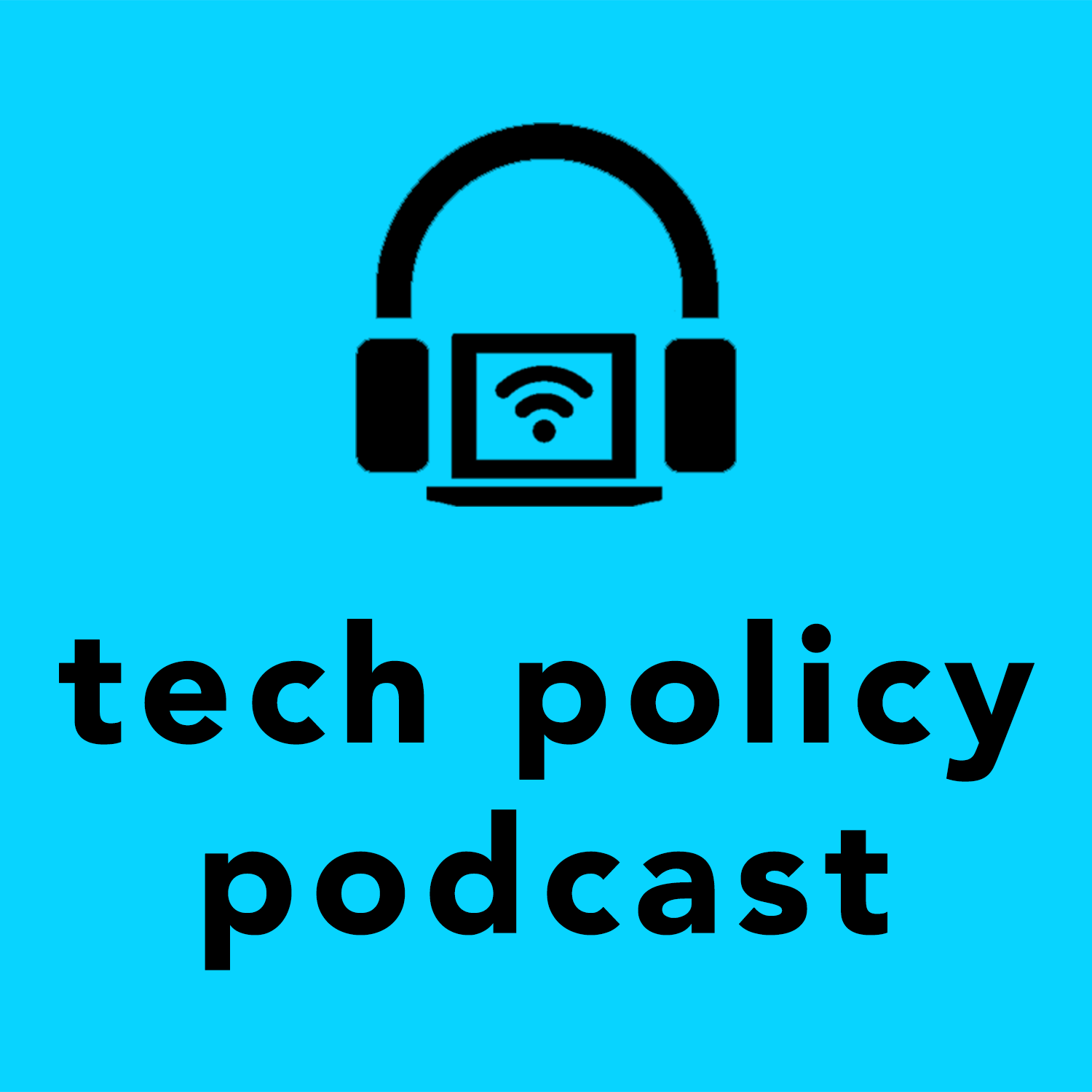Episodes
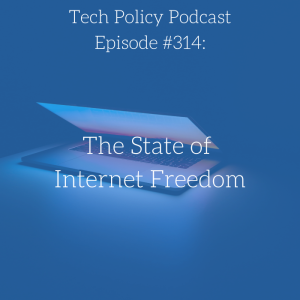
Tuesday Mar 15, 2022
#314: The State of Internet Freedom
Tuesday Mar 15, 2022
Tuesday Mar 15, 2022
The Internet can be a powerful tool for decentralization and resistance. Lately, however, authorities from across the political spectrum have been trying to use it to enforce conformity and exert control. Ari Cohn, TechFreedom’s Free Speech Counsel, and Rachel Altman, its Director of Digital Media, join the show to discuss government efforts to stamp out the Canadian trucker protest, to limit end-to-end encryption, and to dictate how private companies engage in content moderation; and to assess what those efforts mean for the future of Internet freedom.
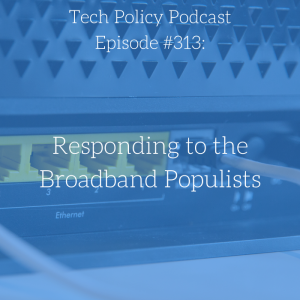
Thursday Mar 03, 2022
#313: Responding to the Broadband Populists
Thursday Mar 03, 2022
Thursday Mar 03, 2022
Activists like to shower the American broadband industry with criticism. In a new paper, Anticorporate Broadband Populists’ Real Agenda: Destroy the Current Private-Sector System, Robert Atkinson, founder and president of the Information Technology and Innovation Foundation, highlights the activists’ ultimate goal: to turn broadband into a government-run utility. Rob joins TechFreedom’s Corbin Barthold and James Dunstan to discuss the holes in the activists’ arguments, the problems with municipal broadband, and the (pretty darn good) state of the broadband industry.
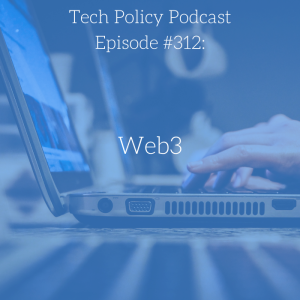
Tuesday Feb 22, 2022
#312: Web3
Tuesday Feb 22, 2022
Tuesday Feb 22, 2022
Web3 could lead to greater decentralization, authentication, and immutability on the Internet. But what does that mean? It’s about much more than just crypto and NFTs. Joining the show to break things down are Hillary Brill, a senior fellow at Georgetown Law’s Institute for Technology Law and Policy, and Gabrielle Hibbert, co-founder of Bloom, a Web3 development education program for women and genderqueer individuals. They discuss whether Web3 is in fact the “next big thing” for the Internet, explain the technology that makes it possible, and dispel some of the misconceptions about it. Hillary and Gabrielle are both members of the Decentralized Future Council, an initiative that aims to help policymakers understand decentralized technologies.
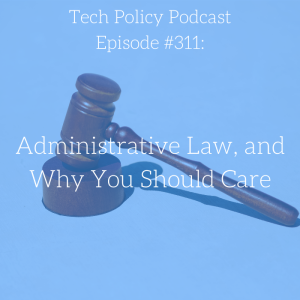
Thursday Feb 03, 2022
#311: Administrative Law, and Why You Should Care
Thursday Feb 03, 2022
Thursday Feb 03, 2022
Administrative law—including key administrative law principles, such as the “major questions” and “nondelegation” doctrines—deserves far greater public attention. You’ll find out why on this episode, in which host Corbin Barthold is joined by Andrew Grossman, a partner at BakerHostetler and an adjunct scholar at the Cato Institute. Andrew is counsel for a party in West Virginia v. EPA, an important administrative law case before the Supreme Court this term. He and Corbin discuss major questions, nondelegation, the West Virginia litigation, the importance of the constitutional separation of powers, the future of the administrative state, and more. Catch the oral argument in West Virginia on February 28. Also, check out Corbin’s recent paper on these issues: A Path Forward on Nondelegation.
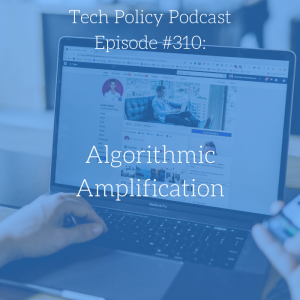
Thursday Jan 20, 2022
#310: Algorithmic Amplification
Thursday Jan 20, 2022
Thursday Jan 20, 2022
Algorithmic amplification is the latest hot topic in the (seemingly endless) debate over social media content moderation. Legislators are introducing bills that would regulate when and how social media websites may “amplify” content by placing it near the top of people’s newsfeeds. But are these bills constitutional? Do they even address the problems the legislators claim to care about? Daphne Keller, a fellow at Stanford University’s Center for Internet and Society, is the author of Amplification and Its Discontents, a seminal paper on these subjects. She joins host Corbin Barthold and Ari Cohn, Free Speech Counsel at TechFreedom, to discuss her paper, the obstacles to regulating speech-related algorithms, the fact that there is no “un-amplified” social media Eden to return to, and more.
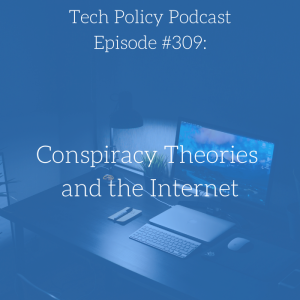
Tuesday Jan 11, 2022
#309: Conspiracy Theories and the Internet
Tuesday Jan 11, 2022
Tuesday Jan 11, 2022
Is social media accelerating the spread of conspiracy theories? It sure feels like it: look at anti-vaxxers, claims about election fraud, and QAnon. Professor Joseph Uscinski, a political scientist at the University of Miami, argues that this widespread hunch is not supported by the evidence. He and host Corbin Barthold examine that view, with a focus on what polling data says about the prevalence of conspiracy theories over time. They also discuss how the Internet affects public opinion (or not), when conspiracy theories become dangerous, how people should form beliefs, whether birds are real, whether King James II fathered a “warming pan baby,” and more.
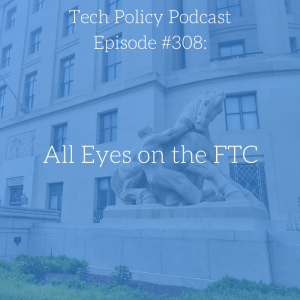
Tuesday Dec 21, 2021
#308: All Eyes on the FTC
Tuesday Dec 21, 2021
Tuesday Dec 21, 2021
The Federal Trade Commission is making headlines lately, as its new chair, Lina Khan, seeks to impose a “neo-Brandeisian” antitrust agenda. Adam Cella, an attorney advisor to FTC Commissioner Christine Wilson, joins the show to discuss what’s happening at the agency. For more, see Commissioner Wilson’s speech, The Neo-Brandeisian Revolution: Unforced Errors and the Diminution of the FTC, given last month at the ABA Antitrust Law Section’s Fall Forum.
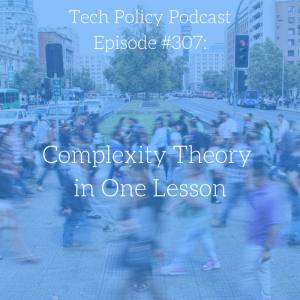
Tuesday Dec 14, 2021
#307: Complexity Theory in One Lesson
Tuesday Dec 14, 2021
Tuesday Dec 14, 2021
Neil Chilson has written a great new book: Getting Out of Control: Emergent Leadership in a Complex World. He and host Corbin Barthold discuss the book, complexity, emergent phenomena, effective leadership in a fast-changing world, and the need for epistemic humility in policymaking (and elsewhere). Also covered: fractals, free will, and the risks of taking advice from hermits in caves. Neil is a senior research fellow for technology and innovation at Stand Together and a former chief technologist at the Federal Trade Commission.
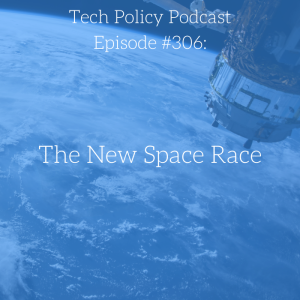
Tuesday Nov 23, 2021
#306: The New Space Race
Tuesday Nov 23, 2021
Tuesday Nov 23, 2021
Jeff Bezos, Richard Branson, and even William Shatner have just been to space. Elon Musk is building rockets, launching satellites, and dreaming of going to Mars. The reaction on Twitter has been . . . snark!? TechFreedom’s own James Dunstan (a bona fide space lawyer) and Corbin Barthold (who’s been on Disneyland’s Space Mountain ride) discuss the new space entrepreneurs, the regulatory hurdles they face, and why people should root for them to succeed. For more, see Jim’s Medium post, “Bring on the Space Barons,” and Corbin’s article in The Bulwark on SpaceX’s Starlink satellite project.
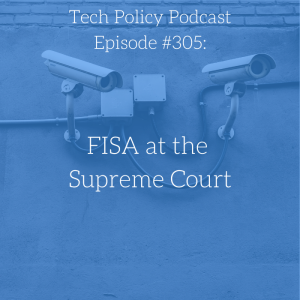
Wednesday Nov 03, 2021
#305: FISA at the Supreme Court
Wednesday Nov 03, 2021
Wednesday Nov 03, 2021
On November 8, the Supreme Court will hear oral argument in FBI v. Fazaga, an important case on the meaning and scope of the Foreign Intelligence Surveillance Act. The system of domestic foreign-intelligence spying created by FISA has been plagued with abuse and controversy. Could the Court use Fazaga to address some of the system’s shortcomings? Elizabeth (Liza) Goitein, co-director of the Brennan Center for Justice’s Liberty & National Security Program, joins the show to discuss the case, to give a preview of the argument, and to explain the broader flaws in the FISA framework. For more, see the amicus brief the Brennan Center (joined by TechFreedom) filed in Fazaga.

